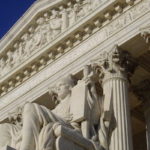
Published July 3, 2023
Another thing that has amazed me is how many folks on the Left—including accomplished lawyers and law professors—are repeating these foolish arguments against standing in 303 Creative. It would be tedious and depressing to compile a list, so I will single out as a striking example someone whose prodigious legal ability I admire, leading Supreme Court advocate Neal Katyal.
In an interview yesterday, Katyal went full crazy on the claim that Lorie Smith’s case is “totally hypothetical and made up.”
I will charitably assume that Katyal has been too busy on other matters to know what he is talking about and that he simply lacked the good judgment not to speak on the matter. I hope that he will correct his position promptly.
It appears that Katyal was also responding to a tweet of mine yesterday in which I stated:
All the new standing experts on Twitter, and folks falsely claiming 303 Creative is “phony case,” are going to go ballistic when they learn that Jane Roe gave birth more than 2-1/2 years before Roe v. Wade was decided.
Katyal rejoined that “Roe was pregnant at the time of the filing of the complaint.” That of course is true. But once you recognize that the Tenth Circuit was correct to find that Lorie Smith showed an “injury in fact” at the time she filed her complaint, that rejoinder becomes meaningless.
Yes, Roe was different. Unlike 303 Creative, it rested on an exception to ordinary standing doctrine—“capable of repetition, yet avoiding review.” That difference cuts against Katyal and all the new Twitter experts on standing, not in their favor.
ED WHELAN — Mr. Whelan holds the Antonin Scalia Chair in Constitutional Studies at the ETHICS AND PUBLIC POLICY CENTER. A regular contributor to National Review’s blog BENCH MEMOS, he has closely covered every Supreme Court confirmation since 2005. @edwhelaneppc
Picture from Unsplash
Edward Whelan is a Distinguished Senior Fellow of the Ethics and Public Policy Center and holds EPPC’s Antonin Scalia Chair in Constitutional Studies. He is the longest-serving President in EPPC’s history, having held that position from March 2004 through January 2021.











